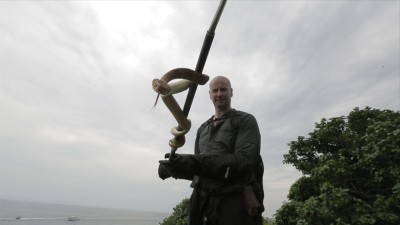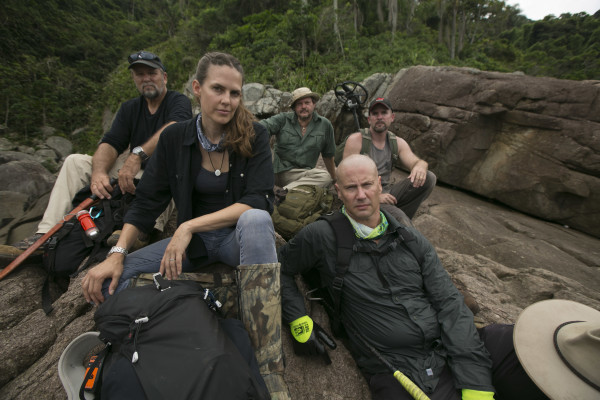INTERVIEW: Bryan Fry snakes his way onto ‘Treasure Quest: Snake Island’

Treasure Quest: Snake Island is set to premiere 10 p.m. Friday, July 17 on Discovery Channel. The reality series follows a group of intrepid adventurers as they search for riches in the southeastern part of Brazil. There are many obstacles along the way, including hundreds of deadly vipers.
That’s where snake expert Bryan Fry enters the picture. As a herpetologist, Fry has 25 years of experience with snakes, and on the series he has his sights set on the golden lancehead vipers.
Recently, Hollywood Soapbox exchanged emails with Fry on all things snake. Answers have been slightly edited for style.
How did you first become interested in snakes?
Very early on, I was struck with a deep and abiding love for all the nasty little creatures out there. I was only 4 when I grandly announced I would study venomous snakes when I grew up. I was not into fluffy bunnies or downy ducklings. I liked my creatures sharp and full of chemicals. Just like me.
You’ve been bitten 26 times? What case was one of the worst?
The worst and also the scariest was a bite from a Stephen’s banded snake, which destroyed the ability of my blood to clot. I was now at the same risk of bleeding to death as a hemophiliac. A dark tide slowly spread under my skin where intravenous needles had been inserted in each arm, as the blood leaked out of me. Bleeding out of one nostril and then the other followed not long after. Then out of each eye, so that it looked like I was crying tears of blood. I could have rung up the lab and said, ‘I won’t be coming in today – my stigmata are acting up.’ This was terrifying in a rather cool way. But once I started bleeding out of my anus, life was decidedly not cool. I bled out of every orifice for the next 18 hours until the anti-venom finally neutralized the venom to save my life.

What’s unique about the golden lancehead viper? How does it compare to other snakes?
Because it feeds on birds, it must have a very fast-acting venom in order to prevent the prey from escaping. This puts it under a very different evolutionary selection pressure than its mainland relatives, which feed on rodents, that can be tracked post-bite. If the bird takes off into the air, it is gone forever, even if it dies mid-flight and comes down to the earth later on. The snake will not get its meal. So the venom has changed as a result. These sorts of changes are what make it a potential source of new drugs since it is now chemically quite different than the mainland forms of lancehead vipers.
What were the unique challenges of hunting for this treasure and ensuring the safety of the team from thesnakes?
There were many challenges, ranging from the violent surf pounding [the] island, making getting on and off very dangerous, to the large and slippery rocks, with falling being a major hazard, to the super abundant snakes themselves. So danger was literally all around us. This was combined with me being with team members I did not select and thus were not properly trained up for such fieldwork, especially the snake side of things. This meant I had to be constantly not only look out for my own safety but also watching every single step the rest of the team took. Obviously this was extremely energy draining. Leaving me mentally and physically exhausted at the end of every long day.
Why do you think snakes have been feared for so many centuries? Do you also fear some of them?
Venomous snakes have been feared because they kill. They are also very alien in their appearance and how they move. This leads to many misunderstandings about them. They are not mindless killers. They only bite people because they are scared. They do not view us as potential prey. In fact, they view us as a potential predator. I do not fear snakes. Indeed I have a deep and abiding fascination and wonderment for these magnificent creatures.
By John Soltes / Publisher / John@HollywoodSoapbox.com
- Treasure Quest: Snake Island premieres 10 p.m. Friday, July 17 on Discovery Channel. Click here for more information.

